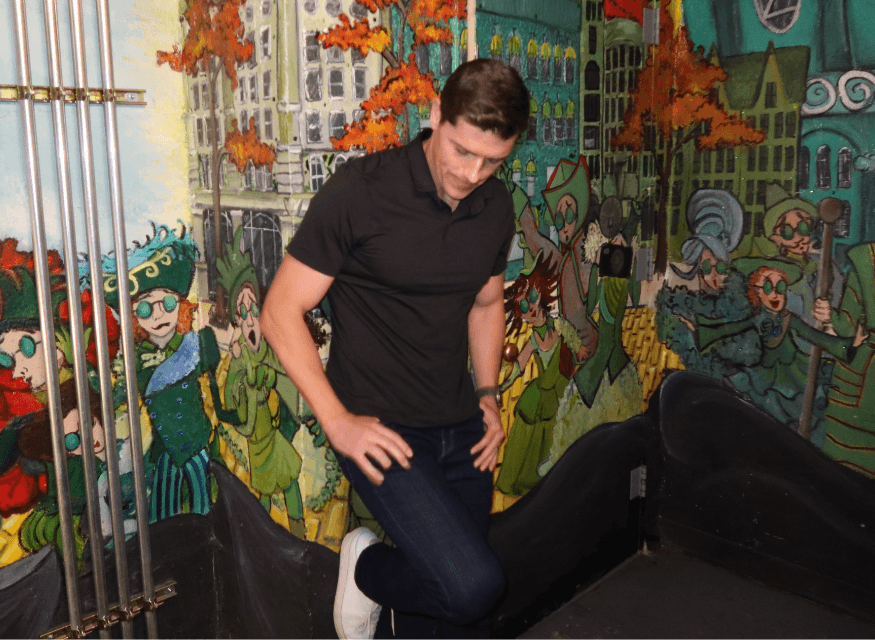How Living Alone Changes You After College
Luke’s move from roommates to his own NYC apartment says a lot about what growing up really looks like.
By
Josh Felgoise
May 30, 2025
When you graduate, the way you rest changes.
What used to recharge you in college, sitting around with roommates, watching football, talking trash, being surrounded by noise, can suddenly feel exhausting instead of comforting.
Luke didn’t expect that shift. But once he moved out and bought his own apartment in New York, it became impossible to ignore.
“I think post college, I think I found that I like to kind of do that on my own. Recharge.”
That realization isn’t antisocial.
It’s adulthood.
If this transition feels confusing or isolating, Why Do I Feel So Lost After College? dives deeper into why post-grad life often feels emotionally louder and quieter at the same time.
How You Used to Recharge
In college, recovery was social.
After a long week, you’d end up on the couch with your roommates. Someone had a game on. Someone else was half-working, half-hanging out. You didn’t need silence. You needed familiarity.
“I think like as far as recharging my social battery… in college, I would want to do that by like lounging around with my housemates and watching football… bantering.”
That worked because college life was built around constant community. You were never fully alone, and you didn’t need to be.
Psychologically, this makes sense. Studies from Harvard Health Publishing show that constant ambient social contact can reduce perceived stress, even when interactions are passive.
Why That Stops Working After Graduation
Post-grad life drains you differently.
Your energy now goes to work, commuting, deadlines, coworkers, dates, networking, responsibilities. By the time you get home, your social battery isn’t empty because you’re lonely.
It’s empty because you’ve been on all day.
That’s when Luke noticed the shift.
“But I think post college, I think I found that I like to kind of do that on my own. Recharge.”
Silence stopped feeling boring.
It started feeling necessary.
If work is the main source of that drain, How Do I Make Time For The Gym When I Work Full Time breaks down why adult fatigue feels different than school burnout.
The Space Problem No One Talks About
Living in New York made this clearer.
When you’re older, space matters more. Not just physical space, mental space.
“Living in New York, when you have roommates chances are you’re living on top of each other… our apartment was just so goddamn small.”
When your living room is also someone’s bedroom, office, and social hub, there’s nowhere for your mind to land.
You’re never fully off.
Research from The American Psychological Association shows that chronic environmental overstimulation can increase irritability, fatigue, and emotional withdrawal over time.
That constant low-level stimulation adds up.
Realizing Your Needs Changed
This is one of the quiet wake-up calls of your twenties.
“I think the biggest thing post-grad versus in college is realizing that type of stuff about yourself. Like, you need more time to recharge.”
You’re not becoming boring.
You’re becoming aware.
Learning how you recharge is part of growing up. And for a lot of guys, that means solitude hits differently than it used to.
This same self-awareness shows up in What No One Tells You About Life After College especially when social needs start diverging.
Why Living Alone Changes Everything
Luke didn’t move out because he hated people.
He moved out because he wanted control.
Control over noise.
Cleanliness.
Temperature.
Schedule.
Stillness.
“It’s been really great… just to have my own space.”
Living alone gives you permission to do nothing without explaining it. To sit in silence without feeling awkward. To reset on your own terms.
That space doesn’t isolate you.
It stabilizes you.
The Loneliness No One Warns You About
Even when it’s the right decision, living alone comes with moments of doubt.
“There’s still moments where I was just like lonely… thought it was gonna be way different… it’s not how life is anymore.”
That part is real.
Adult life doesn’t come with built-in hangouts. You have to plan everything now. And when you stop filling every gap with people, you start hearing your own thoughts more clearly.
That can be uncomfortable before it becomes peaceful.
If that loneliness turns into self-questioning, How To Spend Time Alone (And Actually Like It) helps reframe solitude as stability instead of absence.
The Adult Social Shift
College life was constant motion.
Adult life is intentional.
“Every day was something. So life is just totally different now.”
Now you choose when to go out.
Who you spend time with.
When you need space instead.
Your circle gets smaller, but stronger.
Being social stops being about quantity and starts being about fit.
Here’s the Thing
Learning to recharge alone doesn’t mean you’re withdrawing from life.
It means you’re protecting your energy so you can actually show up when it matters.
“I think post college, I think I found that I like to kind of do that on my own. Recharge.”
That’s not antisocial.
That’s self-awareness.
The more you respect how you recharge, the better friend, partner, and professional you become.
Frequently Asked Questions
Why do I need more alone time after college?
Adult life demands more emotional and mental energy. Solitude helps your nervous system reset after constant stimulation.
Is it normal to feel drained by roommates after graduating?
Yes. Your tolerance for noise, mess, and constant interaction often decreases as responsibilities increase.
Does preferring alone time mean I’m becoming antisocial?
No. It usually means you’re learning how to manage your energy more intentionally.
Why does living alone feel both peaceful and lonely?
Because solitude brings clarity. It removes distractions, which can feel uncomfortable before it feels grounding.
How do I balance alone time with staying social?
Be intentional. Protect your recharge time, then show up fully when you choose to be social instead of forcing constant interaction.










